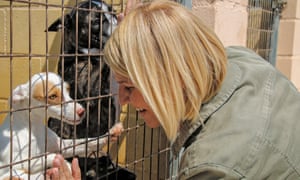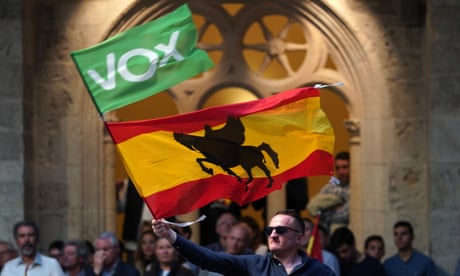Pacma was founded 16 years ago to put an end to bullfighting.
Photograph: Pedro Armestre/AFP/Getty Images
Anti-bullfighting party set for Spanish election breakthrough
As the right enlists bullfighters as candidates, animal welfare champions are polling well
If the polls and pundits are correct, Spain’s Vox party will achieve its much-prophesied breakthrough in Sunday’s general election, becoming the first far-right grouping to win more than a single seat in parliament since the country embarked on its post-Franco return to democracy.
Although Vox’s chances of attracting around 11% of the vote have
hogged the headlines, another small party – and one with a markedly
different worldview – is also gearing up for a historic day at the
ballot box.
The animal rights party Pacma, founded 16 years ago to put an end to bullfighting, could win two seats in the congress of deputies, according to the most recent poll by the country’s Centre for Sociological Studies (CIS).
The animal rights party Pacma, founded 16 years ago to put an end to bullfighting, could win two seats in the congress of deputies, according to the most recent poll by the country’s Centre for Sociological Studies (CIS).
Like Vox’s looming breakthrough, Pacma’s arrival in the arena of national politics would have been extraordinarily unlikely even a few years ago.
The Spanish environmental party Equo managed to win three seats in parliament in the 2015 general election, but only after joining the coalition led by the anti-austerity Podemos party.
Pacma’s leader, Silvia Barquero, attributes Pacma’s sudden momentum to years of hard work, demographic changes and a growing awareness of animal rights and environmentalism in Spain.
“More and more people are putting their trust in us as a political group,” she told the Guardian.
“If we manage to win two seats, we’d be making history in the country where bullfighting happens and where they still abandon and hang greyhounds.
It’s such a damaging image for the country to have.”
Silvia Barquero, president of the animal welfare party Pacma. Photograph: Partido Animalista/PACMA/Flickr
Vox and the conservative People’s party (PP) have taken the opposite tack, signing up bullfighters and the widow of a torero killed in the ring three years ago as candidates, and seeking to portray themselves as the guardians of Spain’s rural traditions.
But Barquero believes that more and more Spaniards are coming to
reject bullfighting and “don’t feel able to identify with a country
which sees it as a national celebration”.
She added: “There’s a new generation of people who are worried about animals and the environment and who have an understanding of social justice that goes far beyond what you see in Spanish politics at the moment.”
The party, which is also expected to win its first seats in the European parliament in next month’s elections, has seen its vote increase from 44,795 in 2004 to 286,702 in the 2016 general election. This time round, it is hoping to secure around half a million votes.
Barquero says Pacma’s second priority after animal welfare is protecting the environment and introducing “drastic and immediate measures” to tackle climate change.
She says that there has never been a strong tradition of environmental parties in Spain, and argues that the Equo party was “totally neutralised” after joining forces with Podemos.
But she insists that environmental issues are too pressing to be ignored or approached with quick-fix political solutions.
“We need global measures that go well beyond the ridiculous local ones that political parties talk about during election campaigns,” she said.
“They’re only thinking about the next election – not about the consequences of their political decisions for the generations that will follow.”
For too long, she said, Spanish political parties had been seeking to make political capital out of the Catalan independence crisis and playing on “tensions and talk of borders and flags”.
“People are sick and tired of the political situation in Spain, which is going nowhere, and of the lack of authenticity from its politicians,” said Barquero.
“We’re sadly used to the idea that a politician says one thing and then does the opposite here. [But] there’s a new generation that’s completely in step with Pacma’s values. It’s young people between 18 and 35. Most of our voters are women in that age group.”
She added: “There’s a new generation of people who are worried about animals and the environment and who have an understanding of social justice that goes far beyond what you see in Spanish politics at the moment.”
The party, which is also expected to win its first seats in the European parliament in next month’s elections, has seen its vote increase from 44,795 in 2004 to 286,702 in the 2016 general election. This time round, it is hoping to secure around half a million votes.
Barquero says Pacma’s second priority after animal welfare is protecting the environment and introducing “drastic and immediate measures” to tackle climate change.
She says that there has never been a strong tradition of environmental parties in Spain, and argues that the Equo party was “totally neutralised” after joining forces with Podemos.
But she insists that environmental issues are too pressing to be ignored or approached with quick-fix political solutions.
“We need global measures that go well beyond the ridiculous local ones that political parties talk about during election campaigns,” she said.
“They’re only thinking about the next election – not about the consequences of their political decisions for the generations that will follow.”
For too long, she said, Spanish political parties had been seeking to make political capital out of the Catalan independence crisis and playing on “tensions and talk of borders and flags”.
“People are sick and tired of the political situation in Spain, which is going nowhere, and of the lack of authenticity from its politicians,” said Barquero.
“We’re sadly used to the idea that a politician says one thing and then does the opposite here. [But] there’s a new generation that’s completely in step with Pacma’s values. It’s young people between 18 and 35. Most of our voters are women in that age group.”
Pacma supporters at a march against bullfighting in Madrid in September last year. Photograph: Partido Animalista/PACMA/Flickr
She said that Pacma’s commitment to the animal welfare and the
environment was evident in the fact that its leaders and spokespeople
were all vegans.
“We believe that meat production is one of the main threats to the planet when it comes to climate change – and we’re personally committed to doing something about it,” she said.
“That’s the best way to show we’re on the side of the environment and of people.”
Barquero says Pacma’s entire philosophy is based on empathy and minimising suffering and inequality.
The party is engaged in an internal debate about abortion and the point at which foetuses begin to feel pain.
“There’s no ethical debate about suffering when someone is just two cells, but there is when the foetus has the nerve stimuli to be able to feel and suffer,” she said.
“We’re very interested in knowing, scientifically, at what exact point that happens. For us, that’s where the limit should be and after which abortion should not be permitted. It’s ethically unacceptable.”
… we have a small favour to ask. More people around the world are reading The Guardian’s independent, investigative journalism than ever before. We’ve now been funded by over one million readers.
And unlike many news organisations, we have chosen an approach that allows us to keep our journalism open to all. We believe that each one of us deserves access to accurate information with integrity at its heart.
The Guardian is editorially independent, meaning we set our own agenda. Our journalism is free from commercial bias and not influenced by billionaire owners, politicians or shareholders. No one edits our editor. No one steers our opinion.
This is important as it enables us to give a voice to those less heard, challenge the powerful and hold them to account. It’s what makes us different to so many others in the media, at a time when factual, honest reporting is critical.
Every contribution we receive from readers like you, big or small, goes directly into funding our journalism.
This support enables us to keep working as we do – but we must maintain and build on it for every year to come. Support The Guardian from as little as €1 – and it only takes a minute. Thank you.
“We believe that meat production is one of the main threats to the planet when it comes to climate change – and we’re personally committed to doing something about it,” she said.
“That’s the best way to show we’re on the side of the environment and of people.”
Barquero says Pacma’s entire philosophy is based on empathy and minimising suffering and inequality.
The party is engaged in an internal debate about abortion and the point at which foetuses begin to feel pain.
“There’s no ethical debate about suffering when someone is just two cells, but there is when the foetus has the nerve stimuli to be able to feel and suffer,” she said.
“We’re very interested in knowing, scientifically, at what exact point that happens. For us, that’s where the limit should be and after which abortion should not be permitted. It’s ethically unacceptable.”
Barquero describes Pacma and Vox as complete opposites – “we’re as
different as night and day” – but recognises that their existence will
help voters make a very clear choice on Sunday.
Since you’re here…
… we have a small favour to ask. More people around the world are reading The Guardian’s independent, investigative journalism than ever before. We’ve now been funded by over one million readers.
And unlike many news organisations, we have chosen an approach that allows us to keep our journalism open to all. We believe that each one of us deserves access to accurate information with integrity at its heart.
The Guardian is editorially independent, meaning we set our own agenda. Our journalism is free from commercial bias and not influenced by billionaire owners, politicians or shareholders. No one edits our editor. No one steers our opinion.
This is important as it enables us to give a voice to those less heard, challenge the powerful and hold them to account. It’s what makes us different to so many others in the media, at a time when factual, honest reporting is critical.
Every contribution we receive from readers like you, big or small, goes directly into funding our journalism.
This support enables us to keep working as we do – but we must maintain and build on it for every year to come. Support The Guardian from as little as €1 – and it only takes a minute. Thank you.






No hay comentarios:
Publicar un comentario